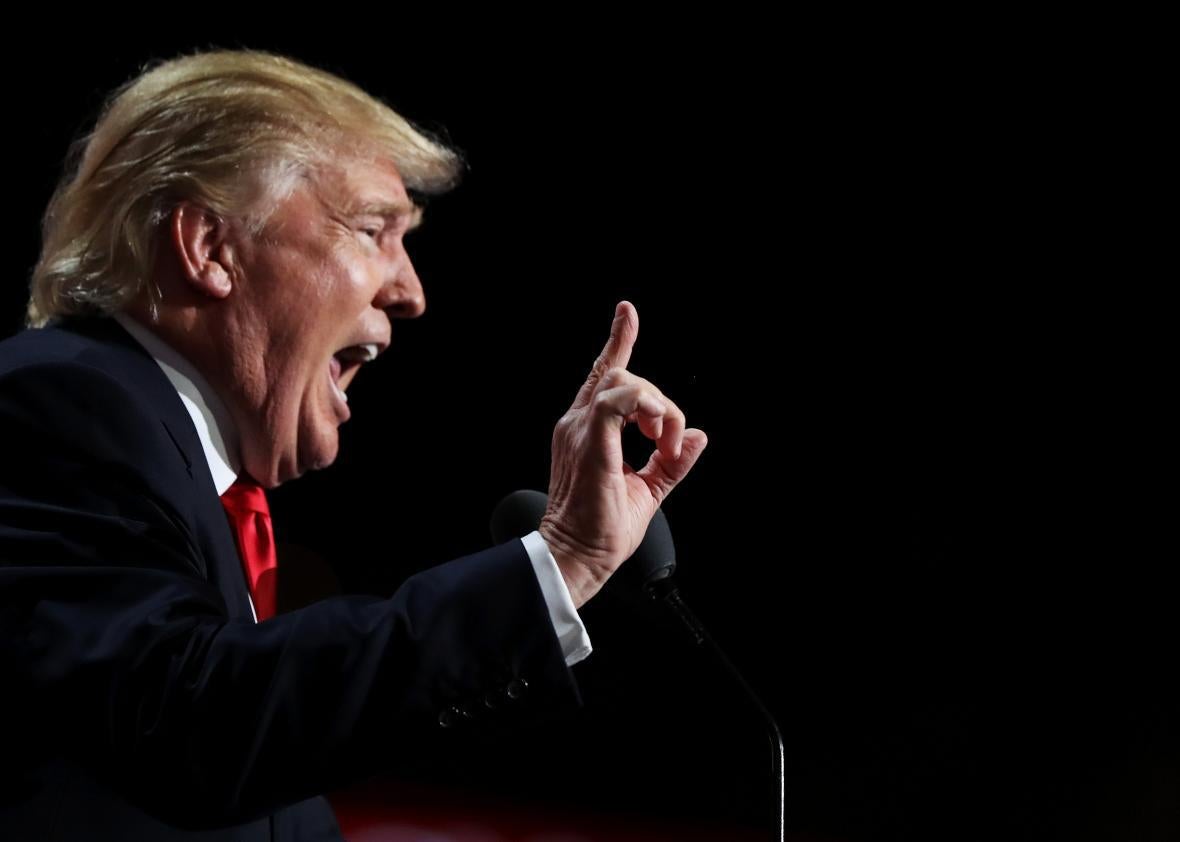Donald Trump is a habitual liar. That is the takeaway from a glorious Washington Post examination of a 2007 deposition about various aspects of his personal wealth in which Trump was caught having lied 30 times.
The lies themselves are phenomenal to behold, but just as incredible are the ways in which Trump attempts to explain them.
As the Post’s David A. Fahrenthold and Robert O’Harrow Jr. put it:
Trump’s falsehoods were unstrategic—needless, highly specific, easy to disprove. When caught, Trump sometimes blamed others for the error or explained that the untrue thing really was true, in his mind, because he saw the situation more positively than others did.
The lies were uncovered as part of the deposition in a lawsuit, which Trump lost, against then New York Times reporter and TrumpNation: The Art of Being the Donald author Timothy L. O’Brien. Here are some of the highlight lies, and Trump’s fantastical explanations for those lies, as uncovered by the Post:
- After a reporter said that Trump owned a “small minority stake” in a real estate project, Trump wrote to him to call him a “real loser” and ask if “50 percent [is] small?” Trump actually owned 30 percent in the project. “The 30 percent equates to much more than 30 percent,” he said in the deposition. He was then asked: “Are you saying that the real estate community would interpret your interest to be 50 percent, even though in limited partnership agreements it’s 30 percent?” His response: “Smart people would.”
- When asked if he had ever not been truthful about his net worth, which he had claimed was $6 billion when evidence showed it to be much less than that, Trump responded this way: “My net worth fluctuates, and it goes up and down with markets and with attitudes and with feelings, even my own feelings. But I try.”
- When asked if he had ever lied in public statements about his properties Trump said, “I try and be truthful. I’m no different from a politician running for office. You always want to put the best foot forward.”
- Trump said publicly that he got paid $1 million for a speech but was only paid $400,000. He said in the deposition that he was factoring in “publicity” from the speech. He was then asked this: “Do you actually say that when you say you got paid more than a million dollars publicly?” He responded like this: “I don’t break it down.”
- Trump told Larry King he employed “22,000 or so” people. When asked in the deposition “Are all those people on your payroll?” he responded, “No, not directly.”
- To an author of a book about him, Trump said, “I had zero borrowings from [my father’s] estate. … I give you my word.” In the deposition, Trump was asked if he had ever borrowed and he said this: “I think a small amount a long time ago. I think it was like in the $9 million range.”
- In one of the books he had authored, Trump claimed the membership fee to one of his golf courses cost $300,000. It cost $200,000. When asked about this, Trump said: “We’ve sold many for two hundred. … We’ve sold many for, I think, two-fifty.” When confronted with a document that showed the fee was actually $200,000, Trump responded “correct, right.”
- In his 2004 book, Trump: How to Get Rich, Trump—telling the story of his financial comeback—wrote “I owed billions upon billions of dollars—$9.2 billion to be exact.” The actual debt, documents showed, was much lower. Trump blamed his co-author and favorite personal patsy Meredith McIver for the error and said that he told her about it after the book was published but didn’t have it corrected. The lawyers than pointed that in another book he published with McIver three years later, Trump again wrote, “In fact, I was $9 billion in debt.” Again, it was McIver’s fault: “She probably forgot.” When asked if he had corrected mistake in the book, of which he was the co-author, Trump said, “I didn’t see it. … I read it very quickly.”
Trump ignored questions from the Post but gave a statement to the paper saying, “O’Brien knows nothing about me. His book was a total failure and ultimately I had great success doing what I wanted to do—costing this third rate reporter a lot of legal fees.”
As the Post noted, O’Brien’s publisher and insurance company paid to defend him in Trump’s failed nuisance litigation so it did not cost him anything to litigate.
